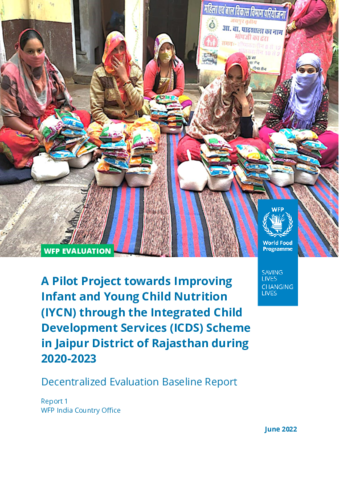
The evaluation was commissioned to provide an in-depth analysis of the situation and parameters to be targeted through the pilot, especially the current knowledge-attitude-practices regarding IYCF and nutrition, and care during pregnancy; take-home rations demand, availability, uptake, consumption, and acceptability, to support in benchmarking of Key Performance Indicators and to facilitate operational planning and establishing the basis for evaluation on completion of the project. Additionally, this evaluation also examined the nutritional status of children (6-36 months) through anthropometric measurements.
The evaluation focused on assessing the relevance, coherence, effectiveness, efficiency, impact, and sustainability of the pilot. Overarching evaluation questions focused on establishing a replicable, efficient demonstrable, and operationally effective model, that ensures nutritious and affordable take-home rations to pregnant and lactating women, infants, and young children in a sustainable way, Improved nutritional knowledge, awareness, and behaviors amongst caregivers, adolescents, PLWs and other stakeholders and anthropometric assessment.
Key evaluation findings included:
- In general, pregnant women have awareness of the importance of good nutrition during pregnancy. However, owing to socio-cultural restrictions and misconceptions in the family, many times pregnant women are not able to consume nutritious food items despite nutrition awareness.
- Target groups are aware of the importance of a nutritious diet and about feeding take-home rations to a child 6-36 months.
- Almost three-fourths of the pregnant and lactating women (mothers of children 6-36 years) are aware of the correct practices of breastfeeding. However, there are gaps when it comes to translation of this knowledge into practice, especially regarding aspects such as exclusive breastfeeding and duration of continued breastfeeding.
- For Hygiene and Morbidity, the caregivers do not wash hands before feeding their child in 28 percent of households and 31 percent of children had a fever in the two weeks prior to the survey.
- Regarding Nutritional Status of Children, 15 percent of girls and 24 percent of boys were found to be underweight, 19 percent of girls and 24 percent of boys were found to be stunted, and about 10 percent of girls and 21 percent of boys were also found to be wasted. A higher proportion of malnourished children is from marginalized social categories and lactating women with low educational qualifications.
- All the sample pregnant and lactating women beneficiaries affirmed receiving the take-home ration in form of a dry ration, but only about four-third of pregnant and lactating women reported receiving the take-home ration from the Anganwadi workers for themselves.
Key lessons issues for concern from the evaluation included;
- Though most pregnant and lactating women have awareness of aspects related to nutrition and Iron Folic Acid consumption during pregnancy, there is a gap when it comes to translation of knowledge into practice. Besides, there is a need to address the beliefs, self-efficacy, and social norms regarding nutritional intake.
- It is required that under the Social Behaviour Change Communication (SBCC) component of the pilot project, the lactating women are appropriately made aware, counselled, and motivated to ensure minimum dietary diversity in the daily diet of their children as per their age.
- Under the SBCC and capacity building components of the pilot project, emphasis should be on awareness generation for pregnant and lactating women, especially from marginalized families and with lower education; and capacity building for the frontline functionaries (who are the first point of contact) on appropriate breastfeeding practices.
- Activities for enhancing uptake and consumption/uptake of take-home rations by targeted beneficiaries and developing THR recipes with enhanced taste, need to be a focus area under the proposed pilot.
- The SBCC should be a combination of interpersonal and individually contextualized counselling & individualized skilled support to beneficiaries and their family members, complemented by supportive mid-media & mass media activities for consistent and repeated messaging/communication.
